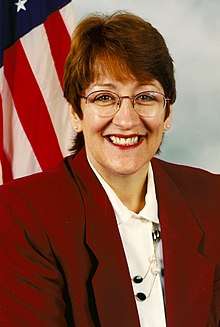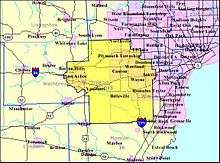Lynn N. Rivers
Lynn Nancy Rivers (born December 19, 1956) is an American politician and lawyer from Michigan.
Lynn N. Rivers | |
|---|---|
 | |
| Member of the U.S. House of Representatives from Michigan's 13th district | |
| In office January 3, 1995 – January 3, 2003 | |
| Preceded by | Bill Ford |
| Succeeded by | John Dingell (Redistricting) |
| Member of the Michigan House of Representatives from the 53rd district | |
| In office January 13, 1993 – January 11, 1995 | |
| Preceded by | Perry Bullard |
| Succeeded by | Elizabeth Brater |
| Personal details | |
| Born | December 19, 1956 Au Gres, Michigan |
| Political party | Democratic |
| Education | Wayne State University (JD) University of Michigan (BA) |

Biography
Rivers was born in Au Gres, Michigan and graduated from Au Gres-Sims High School, Arenac County, in 1975. She received a B.A. from the University of Michigan in 1987 and a J.D. from Wayne State University in 1992. She served as a trustee of the Ann Arbor board of education from 1984 to 1992 and was a member of the Michigan State House of Representatives between 1993 and 1994.
Rivers was elected as a Democrat from Michigan's 13th District to the United States House of Representatives for the 104th and to the three succeeding Congresses, serving from January 3, 1995 to January 3, 2003. Rivers resorted to negative attack ads against her opponent David W. Geiss (the endorsed candidate of sitting Congressman William D. Ford) to win the Democratic primary in 1994. Her district was eliminated after Michigan lost a district in the United States 2000 Census, and most of her territory was merged with the 15th District of long-time incumbent John Dingell. Rivers challenged Dingell in the Democratic primary for the new 15th. However, running in a district that was over 65 percent new to her, she lost to Dingell.
In 1994, Rivers spoke publicly about her 24-year struggle with bipolar disorder, making her the first member of the House to publicly discuss having emotional problems.[1] In 1998, the National Mental Health Association named her "Legislator of the Year."
Currently, she is teaching Political Science at the University of Michigan and Washtenaw Community College in Ann Arbor.
References
- Thompson, Alex (2015-10-31). "Could America Elect a Mentally Ill President?". Politico Magazine. Politico. Retrieved 2015-10-31.
External links
- United States Congress. "Lynn N. Rivers (id: R000281)". Biographical Directory of the United States Congress.
- Appearances on C-SPAN
| Political offices | ||
|---|---|---|
| Preceded by Perry Bullard (D) |
State Representative for Michigan's 53rd District 1993–1995 |
Succeeded by Elizabeth Brater (D) |
| U.S. House of Representatives | ||
| Preceded by Bill Ford |
Member of the U.S. House of Representatives from Michigan's 13th congressional district 1995–2003 |
Succeeded by Carolyn Cheeks Kilpatrick |

